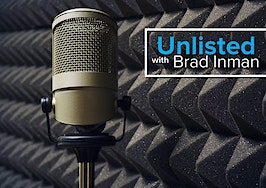- Blockchain will link protected, secured records together for a streamlined transaction.
- It's a secure way to do business, and it can help keep agents safe, too.
Imagine if every homebuyer was identified and validated — as buttoned-up as someone with a passport when entering U.S. Customs.
Get ready. This is going to happen, and it will change your life.
In the next 18 months, the time and effort it takes to find and sell a house and close a transaction will be cut in half. Plus, agents will be safer; buyers and sellers will be digitally pre-screened — like going through airport security — and leads will be better qualified because of an esoteric breakthrough in technology.
Meet blockchain, a new and radical software, which will soon be applied to real estate.
Benefits are overwhelming: less fraud, more transparency, better agent safety, pre-screening of buyers, a few clicks to close and a better system for delivering services after a home is sold.
Disruptive? Yes. Threatening? No.
This goes well beyond a paperless closing.
Am I on drugs? No.
What is blockchain?
Here is how to think about blockchain: blocks are data sets and chains are the relationships between these blocks of data. This decentralized string of databases creates a powerful new way to create the instant closing and a streamlined buying and selling process.
Putting a blockchain together requires records: transactions (home offers, loan qualification and closings) and blocks (personal record and home data). Transactions are the actual data to be stored in the blockchain, and blocks are records that confirm when and in what sequence certain transactions became recorded as a part of the blockchain database.

Working off validated trust, blockchain works because the system depends on separate decentralized and validated databases working together in a way that a complicated transaction can be closed and people and information can instantly be validated.
Real estate is one of the most complicated financial transactions, so it is ripe for blockchain. Consider this is a gift from the housing gods to unravel the gnarly and often protracted real estate transaction.
Fogging over? Hang with me.
Multiple data sets, linked
Consider that real estate transactions are created by lots of different people — consumers, agents, lenders and title companies — using lots of disparate databases that do not sync up. Yuck.
We have multiple data sets. House data includes location, home condition, neighborhood analytics and sales history. Then, there is the personal data of the homebuyer and homeowner, including their financial history. Title records are part of the mix, with the history of the property over time, including any dings or claims.
We have a pile of transactions that make up a home sale, including an accepted purchase offer, the closing, mortgage approval and recorded title.
How does this play out? Imagine all of the transactions linked and all of the data bases married, pre-populated by personal, house records and property history.
Big deal? Sounds nerdy, irrelevant. No, it is very practical.
Imagine the home purchase occurring with a few clicks. Homebuyers and agents are not filling out forms, they are only confirming pre-populated data that is stored and gets smarter like any digital transaction. Plus, all of the data is instantly linked, housing valuations to mortgage approvals to inspection reports to title search.
Safer, faster
Here is where the real fun begins.
Automated showings become a no-brainer, because both the home and the home shopper are pre-verified using blockchain technology. Everyone has a digital ID or they cannot participate in this flow of commerce. Goodbye to the days where you randomly show a house without any identification to a complete stranger. You are safer, and your time is freed up.
This becomes the ATM of housing showings.
This same homebuyer passport will help the agent pre-screen leads, create instant loan approvals and create a powerhouse aftermarket database to deliver other services to the homeowner. No time wasted on unqualified buyers.
What is holding this back?
Not much. The technology exists. And there are scads of start-ups in the emerging fintech sector who are disrupting the banking industry. These software-driven banks deliver faster, easier and safer transactions.
The closing documents for my last transaction are stored in a safe in my house. My safe can be stolen.
With blockchain, my housing docs are digital, not passed around, as safe as my bank account, my health records and my IRS returns.
Consider that blockchain was first used by international drug dealers that deployed bitcoin, virtual money, to buy and sell drugs around the world. They fended off the government for almost a decade, using the encrypted technology of blockchain.
This is safe, gang, and this is a better way to do business. Get on board; your world will never be the same.








